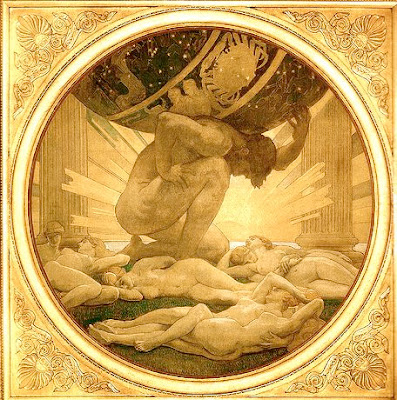Atlas was one of the most famous Titans, the son of Iapetus and the Oceanid Asia (or, possibly, Clymene). He was the leader of the Titan rebellion against Zeus. When the Titans were defeated, many of them (including Menoetius) were confined to Tartarus, but Zeus condemned Atlas to stand at the western edge of Gaia (the Earth) and hold up the sky on his shoulders. Thus, he was Atlas Telamon, "enduring Atlas," and became a doublet of Coeus, the embodiment of the celestial axis around which the heavens revolve.
Encounter with Heracles
One of the Twelve Labors of the hero Heracles was to fetch some of the golden apples which grow in Hera's garden, tended by Atlas' daughters, the Hesperides, and guarded by the dragon Ladon. Heracles went to Atlas and offered to hold up the heavens while Atlas got the apples from his daughters.
Upon his return with the apples, however, Atlas attempted to trick Heracles into carrying the sky permanently by offering to deliver the apples himself, as anyone who purposely took the burden must carry it forever, or until someone else took it away. Heracles, suspecting Atlas did not intend to return, pretended to agree to Atlas' offer, asking only that Atlas take the sky again for a few minutes so Heracles could rearrange his cloak as padding on his shoulders. When Atlas set down the apples and took the heavens upon his shoulders again, Heracles took the apples and ran away.
Variations
In a story, a giant named Atlas tried to drive a wandering Perseus from the place where the Atlas mountains now stand. In Ovid's telling, Perseus revealed Medusa's head, turning Atlas to stone (those very mountains) when Atlas tried to drive him away, because Perseus, who went there accidentally and asked Atlas for hospitality, named himself a son of Zeus and a prophecy said that a son of Zeus would steal the golden apples from Atlas' orchard. As is not uncommon in myth, this account cannot be reconciled with the far more common stories of Atlas' dealings with Heracles, another son of Zeus, who was Perseus' great-grandson and who sought for the golden apples.
Encounter with Heracles
One of the Twelve Labors of the hero Heracles was to fetch some of the golden apples which grow in Hera's garden, tended by Atlas' daughters, the Hesperides, and guarded by the dragon Ladon. Heracles went to Atlas and offered to hold up the heavens while Atlas got the apples from his daughters.
Upon his return with the apples, however, Atlas attempted to trick Heracles into carrying the sky permanently by offering to deliver the apples himself, as anyone who purposely took the burden must carry it forever, or until someone else took it away. Heracles, suspecting Atlas did not intend to return, pretended to agree to Atlas' offer, asking only that Atlas take the sky again for a few minutes so Heracles could rearrange his cloak as padding on his shoulders. When Atlas set down the apples and took the heavens upon his shoulders again, Heracles took the apples and ran away.
Variations
In a story, a giant named Atlas tried to drive a wandering Perseus from the place where the Atlas mountains now stand. In Ovid's telling, Perseus revealed Medusa's head, turning Atlas to stone (those very mountains) when Atlas tried to drive him away, because Perseus, who went there accidentally and asked Atlas for hospitality, named himself a son of Zeus and a prophecy said that a son of Zeus would steal the golden apples from Atlas' orchard. As is not uncommon in myth, this account cannot be reconciled with the far more common stories of Atlas' dealings with Heracles, another son of Zeus, who was Perseus' great-grandson and who sought for the golden apples.

Comments
Post a Comment